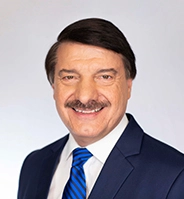As we head into the third year of the pandemic we want to take a moment to celebrate what we have learned and how the medical community has changed for the better. So, we spoke with several physicians across the country and asked them to share their insight.
Healthcare Advancements
American Lung Association’s Chief Medical Officer, Dr. Albert Rizzo, is the first to admit that the COVID-19 pandemic hit our country with a public health and health care challenge unprecedented in most of our lifetimes. “Despite scientific thinking and models predicting such an event to be inevitable, the country and much of our health care infrastructure was caught off guard. Everything from PPE, hospital beds, ventilators as well as health care staff were found to be lacking in number and needing appropriate triaging to serve the significant numbers of the afflicted,” he said.
But Dr. Brian Christman has seen firsthand how hard his fellow physicians have been working to right these wrongs, including how everyone has stepped up to help manage the increased hospital demand. “With each of the surges in COVID-19 those of us in leadership positions have had to reassess hospital capacity, staffing ability, testing strategies, sufficiency of personalized protective equipment, and staff morale. It has become necessary to maintain smooth communication with everyone in our health care system to alleviate staff anxiety and maintain clinical excellence.”
As a professor and vice-chair for clinical affairs and associate program director, medicine residency program at Vanderbilt University, he appreciates the medical advancements that have been made so quickly. “I covered the ICU during the peak of Delta variant-- sadly, none of the five unvaccinated patients survived. That is why it is so important that everyone get vaccinated. Though you can still get breakthrough illnesses, the vaccination is very effective at preventing severe disease that could result in hospitalization or death,” he said.
Chicago allergist and immunologist Dr. Juanita Mora agrees that in the last few years she has learned to multitask to a much greater extent. “I have learned to pivot for my patients and for my community based on their needs and challenges. I have learned to be a voice for those that have no voice at a local and national level dispelling misinformation and helping my community navigate this pandemic,” she said.
This commitment to the community is something that she has seen in her fellow physicians as well. “I want people to know that as doctors and healthcare workers we have kept our oath and worked tirelessly to help the country navigate this pandemic and save lives. And we continue to do so proudly and with a lot of heart and dedication. All we ask of the people is for them to help us end this pandemic by getting vaccinated.”
“Seeing so many around us devastated by the pandemic and knowing that we have a role to play in keeping our patients and one another safe has changed us for the better,” Dr. Stephanie Lovinsky-Desir believes. In her work as the Director of the pediatric pulmonary division at Columbia University Irving Medical Center, she has noticed that the bond between her and her colleagues has grown dramatically. “We are all exhausted and can't wait to be on the other side of this. But we know that the only way through it is by supporting one another.”
Still Growing
“We have learned so much during the pandemic about vaccines and treatments for COVID-19, but little money that has been spent on understanding how most people who contract COVID-19 die of lung failure,” Dr. Meilan Han, professor of internal medicine in the Division of Pulmonary and Critical Care Medicine at the University of Michigan Health System and director of the Michigan Airways Program, adds.
“As a nation we need to prioritize preserving lung health and understanding how to treat lung injury if we are to prevent further deaths. If we don’t make serious changes, the next pandemic will be even worse, assuming we get through this one.”
Dr. Lovinsky-Desir hopes that some of that focus will be given to children, since she has seen a dramatic increase in COVID-19 cases among her younger patients in the last month or so. "We must do our best to keep our children safe. This means vaccinating them when they are eligible and avoiding high-risk activities whenever possible. Children are not immune, and they can spread the virus too,” she said.
Children are just one group that needs more attention. Dr. Rizzo expressed his concerns that COVID-19 has showed the fragility of our most vulnerable—the elderly, the chronically ill and the immunocompromised. “The pandemic has also highlighted two significant societal deficiencies,” he continued.
“First, our advancements in science need to be communicated in a more trusting and culturally aware manner so that all persons will take advantage of the breakthroughs in therapies. Second, that there are inequities in our society regarding the social determinants of health and the results of those inequities became glaringly evident when the various populations effected by the COVID-19 were realized when tabulating morbidity and mortality.”
We thank Dr. Rizzo and all our medical experts who continue to work with the American Lung Association to ensure that we stay the trusted champion of lung health. “With a strong, long history of advocating for equity in health care, the American Lung Association is committed to helping bring this pandemic under control and work to be better prepared for the next respiratory pathogen,” Dr. Rizzo concluded.
Blog last updated: June 7, 2024







